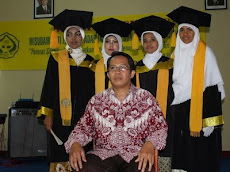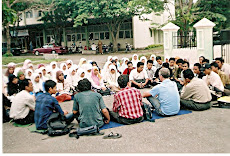

Rabu, 24/12/2008 17:08 WIB
padangmedia.com - PADANG – Setelah 20 peserta tampil dalam lomba Short Story Reading Contest yang diselenggarakan Hima Fakultas Adab jurusan Bahasa Inggris kemarin, akhirnya juri memilih 3 penampil terbaik.
Ketiga terbaik itu adalah Zetriyani dari Universitas Andalas, semester 7 Fakultas Sastra Inggris, Yolanda nita dari Fakultas Tarbiyah IAIN Jurusan pendidikan Bahasa Inggris, dan ketiga adalah Jasman, Jurusan pendidikan bahasa Inggris UNP. Sedangkan penampil favorit adalah Sony Afriadi dari Universitas Bung Hatta Padang.
Menurut Nofel Nofiadri, salah seorang juri, Zetri dinilai dapat membacakan cerpen dengan penghayatan dan penjiwaan saat membacakan The Return of Abel Behena karya Bram Stoker. ”Kebahasaannya juga bagus,” ungkap Nofel kepada padangmedia.com, Rabu (24/12).
Dua pemenang lainnya Yolanda dan Jasman juga dinilai sudah memenuhi standar penilaian dan bisa menghayati naskahnya dengan baik.
Untuk peserta yang menjadi favorit, Sony memenangkan voting dengan pilihan penonton pada saat perlombaan digelar di Fakultas Adab IAIN Imam Bonjol. (dodo)
Selengkapnya...
Misi :
2. Meningkatkan kualitas keilmuan dosen dan mahasiswa dalam bidang bahasa dan sastra Inggris
3. Meningkatkan sarana dan prasarana penunjang akademik
4. Melakukan kerjasama keilmuan dan kemitraan dengan instansi dan lembaga yang relevan
5. Memenuhi kebutuhan tenaga ahli/professi pada instansi dan lembaga-lembaga keagamaan, kebudayaan/kepariwisataan, dan pendidikan
Senin, 26 Januari 2009
Short Story Reading Contest
Minggu, 25 Januari 2009
Drama On Stage
PADANG- Mahasiswa jurusan Bahasa dan Sastra Inggris (BSI) semester 4, Fakultas Adab, IAIN Imam Bonjol, Padang bersama Studio Sastra Adab akan mengadakan pementasan drama berbahasa Inggris, Sabtu (26/07), di Aula Fakultas Adab lantai 2. Pada hari yang sama mahasiswa jurusan Bahasa dan Sastra Arab semester 6 juga mengadakan pertunjukan drama berbahasa Arab. Pementasan kedua jurusan tersebut mengusung tema Saturday Drama.
Seperti disampaikan Nofel Nofiadri, S.S, dosen Drama Fakultas Adab jurusan Bahasa dan Sastra Inggris, bahwa para mahasiswa yang mengambil mata kuliah dramanantinya pada akhir semester akan mengadakan pementasan sebagai bentuk praktek untuk menggarap drama, sehingga yang dipelajari di kelas dapat diaplikasikan.“Drama tersebut merupakan hasil kreasi dari mahasiswa BSI dan BSA. Mereka telah mempersiapkan drama tersebut sejak awal semester genap ini untuk dipentaskan sebagai ujian akhir semester,” jelas Nofel. Nofel juga menambahkan bahwa keseriusan dalam menggarap suatu drama akan menjadi nilai plus, karena perkembangan setiap latihan menambah poin bagi mereka.
Ada 8 drama yang akan ditampilkan, 2 diantaranya berdasarkan novel dan cerpen asing, yaitu The Necklace ialah cerpen penulis Prancis, Guy de Maupassant. Garapan tersebut disutradarai oleh Nicky Astria dan Pride and Prejudice yang merupakan novel karya penulis zaman romantisme, Jane Austen, kali ini disutradarai oleh Syafri Aryo. Kemudian 6 judul drama lainnya yaitu Perfect love oleh Gusri Hariyani, The Empty House oleh Alexsander, Abraham and Issac oleh Astrid Prima, The forbidden Child oleh Fitra Yeni dan Delaying death.
Khusus Delaying Death (kematian yang tertunda) nantinya akan ditampilkan 2 versi, yaitu versi Bahasa Arab disutradarai oleh Vira Amiruza dan versi Bahasa Inggris oleh Humaira. Garapan ini juga dibantu oleh Zelfeni Wimra, dari Teater Imam Bonjol.
(Relis/dodo)
Selengkapnya...
Rabu, 21 Januari 2009
Pairwork

by Nofel Nofiadri
Introduction :
Students like talking to the teacher because it makes them feel important and that they are getting value for money. While this is fine in a one-to-one lesson it is no good in a group because while one student is monopolizing the teacher/conversation everyone else is losing out.
Pair work or group work has the power to allows all student to speak and empowering each one speaking skill.
Pair Work/ Group work :
How:
1. Make a list of pairs of names before the lesson stars or while the students are coming in, or just tell them when the time come: “Joni, you work with Usman; Cici, you’re with Saleh this time”.
2. If there is an odd number of students make a group of three but break them up later in the lesson and put them into paris with someone else so they get more chance to speak.
3. You could put them in small groups to start with if the activity allows. You could even make the activity a competition in small teams if the activity allows, seeing which team gets the most answers right. Use the board or a piece of paper for keeping score.
4. change the partners quite often so that the students don’t get bored with their partner. This is especially important if there is a student who isn’t over popular with the others.
Why
1. it’s good for the students to speak to each other in English.
2. It’s good for the students to work with another students sometimes rather than alone.
Discussion :
I don’t put my students into groups bigger than 3 because I don’t think they get enough chance to speak in such a large group so they switch off, star fidgeting, get frustrated, let the hard-working students do all the work, fall asleep etc. In a pair, one student is speaking and one is listening and formulating a response, in a group of three, one is speaking, and usually the other two are listening and formulating responses, in a group of four, one is speaking, one or two are listening and formulating responses and the other one is asleep, aware that s/he hasn’t got much chance of getting a word in edge ways. Or of course, in a group of four, two speak to each other while the other two often either fall asleep or end up speaking to each other too, in which case you might as well have put them in pairs in their first place.
If you have an odd number of students don’t pair extra student up with yourself, make a group of three somewhere. The other students weren’t daft – they realized they were missing out on the teacher’s attention and I realized they were right. I was short-changing them by not monitoring them as I should.
If you’ve got some talk active and some quiet students, pair the quiet ones together for the fluency activities (as opposed to the vocabulary/grammar activities) to encourage them to talk more. I used to put tone talkactive student in a pair with a quiet one, thinking that the quiet one would speak more if his/her partner was the chatty type. I was wrong – the talkative one monopolizes the conversation and the quiet one is happy to let this happen.
Conclusion :
Speaking ability improvement needs various input and more time in practice, so by conditioning students by pair work and group work you get easier in reaching your students goal to speak.
Refferences :
Brown, H. Douglas, 2002, Strategies for Succes, Longman, New York.
Beson, Nigel C. and Simon Grove, 2000, Psychology for Beginers ( a translation edition), Mizan, Bandung.
Banville, Sean, 2005, Creating ESL/EFL Lessons Based on News and Current Events, The Internet TESL Journal, Vol XI, No.9, September 2005, http:iteslj.org/Techniques/Banville-News/
Jufri, 2005, A Teaching Model for Listening Comprehension An Alternative Technique for Developing Listening Skill ( A paper presented in an Internasional Seminari), State University Padang.
Zainil, 2004, Action and Function Method (AFM), Universitas Negeri Padang Press, Padang.
Regan, Liz, 2003, Teaching Tip 5 : Speaking to Other Students in English, http://www.telfl.net/teacher-training/teaching-tip_05.htm, accessed on Sept 2005
Selengkapnya...

